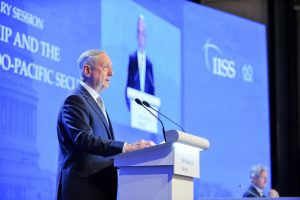U.S President Donald Trump’s surprise decision to force Defense Secretary Jim Mattis out two months early following his decision to resign propelled an additional wave of anxiety across the United States’ allies. Taipei, in particular, is on edge, as the reliability and the direction of policy under an erratic president comes increasingly under question.
To demonstrate U.S. support for Taiwan, Mattis had dispatched warships to the Taiwan Strait three times in 2018. He also pushed back hard against Beijing in the South China Sea, sending warships close to disputed islands that China claims. The abruptness of the Mattis resignation, and then his early dismissal, left Taiwan shocked.
It is noteworthy that a possible crisis over Taiwan, arguably has the greatest potential to escalate into a dangerous confrontation between the United States and China. Mattis offered a consistent approach to pushing back against China. With Trump, everything is negotiable, everything is up in the air. Mattis’ resignation reignited concerns in Taipei about whether the United States could be depended on as an ally. Mattis’ resignation letter made it clear his belief in the value of American alliances and partnerships around the world, the subtext was that Trump did not share that view.
Trump’s surprise decision to rapidly withdraw all U.S. troops from Syria is burning up pages of editorial copy and burdening the minds of pundits, who denounce it as strategically stupid, reckless for national security, and a blow to America’s global credibility. Trump’s decision was cavalier and rash, as it could weaken the country’s influence over any negotiations on a settlement to end the conflict. In Beijing, China’s military leaders were certainly pleased when Trump announced the withdrawal of U.S. troops from Syria.
The recent elections results in the United States, which saw the Democrats take control of the House of Representatives, introduce a high degree of uncertainty into U.S.-China relations. U.S. policy toward Taiwan has always required Washington to triangulate between Beijing and Taipei, and it’s unclear how this balance will be maintained.
Taiwan has been a long-term U.S. ally, and in the shaping of the new situation on the trade war between the United States and China in the future, Taiwan will also play an important intermediary and harmonizing role. Mattis’s departure thus comes at a time when nervousness among U.S. allies is palpable. Under Mattis, the U.S. and China have had some tense moments in the South China Sea and arms sales to Taiwan irked Beijing, but conflict has not escalated and mutual exchanges were continuing. It was a carefully maintained balance, a managed situation.
The unexpected troop withdrawals from in Syria did not just startle Taipei, some analysts predicted the moves could diminish American leverage, rather than enhance it. The Taiwanese in general think Mattis is a rational and cautious person and worry about who will replace him. To many analysts in Taipei, the whole flurry of changes is dizzying, but also part of the new reality.
Kent Wang, Research Fellow at the Institute for Taiwan-America Studies who publishes frequently on the Taiwan issue in Sino-American relations, as well as other topics on East Asian international politics and regional security.
































